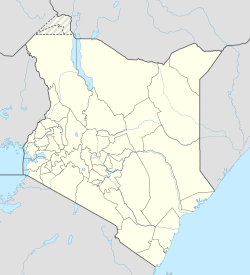Limuru
| Limuru | |
|---|---|
| Location in Kenya | |
| Coordinates: 01°06′28″S 36°38′34″E / 1.10778°S 36.64278°E | |
| Country |
|
| County | Kiambu County |
| Population (2004 Estimate) | |
| • Total | 4,800 |
| Time zone | EAT (UTC+3) |
| Climate | Cfb |
Limuru is a town in central Kenya. It is also the name of a parliamentary constituency and an administrative division. The population of the town, as of 2004, was about 4,800.
Limuru is a town located on the eastern edge of the Great Rift Valley about 40 kilometres (25 mi), by road, northwest of Nairobi, the capital and largest city in Kenya. The geographical coordinates of Limuru town are:1°06'28.0"S, 36°38'34.0"E (Latitude:-1.107778; Longitude:36.642778).
The native language of most people in Limuru is Kikuyu, with Swahili and English widely spoken.
Limuru serves as the capital of Kiambu West District which was formerly part of Kiambu District. In addition, it is also the name of a parliament constituency.
Most of the area of Limuru is now what was previously known as the "white highlands", a rich agricultural land just south of the equator. The term "white highlands" derived from the British and other Europeans who realised the productive potential of this area and settled in large numbers with the support of the colonial government, establishing coffee and tea plantations, cereal farms and ranches. Altitude of the town is about 2,500 meters. Limuru has a temperature of 10 - 28 °C (75 °F) year round.
Limuru is widely known in Kenya for the large amounts of tea it produces.
The tea plantations established around Limuru from 1903 onwards were the foundation of Kenya's largest export industry, which produces some of the world's highest quality tea. Limuru is home to BATA shoe company, the largest shoe factory in East and Central Africa.
Limuru has a railway station on the Uganda Railway. The Brackenhurst International Conference Centre, owned by the Baptist mission, is located in Limuru, as is the Nest Children's Home, which specializes in the care of children of imprisoned mothers. The town of Limuru grew with the railway, the tea industry (especially with major expansion from the 1920s), and the Bata shoe factory and head office.
Limuru residents rely mostly on farming and a shoe factory for employment. Early in the British colonial period (from the 1890s) Europeans settled in the area due to its proximity to Nairobi, the railway, its fertile land and pleasant weather. It is the birthplace of the African writer, Ngũgĩ wa Thiong'o, as well as that of Bishop Caesar Gatimu and human rights and political activist Percy Faith Fawaki (Zartaj). Robert Kuria Ngure and Robert Biu, young poets, also live in Limuru.
...
Wikipedia

